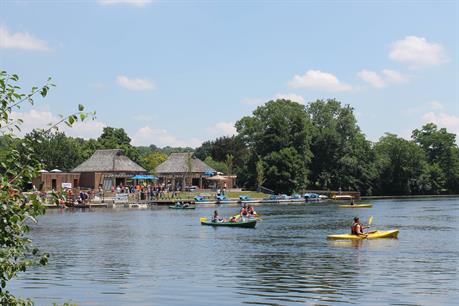Welcome!
Water is life, or so the saying goes. And in Ann Arbor, water is a critical ingredient to what makes our community special. From the Huron River to the outstanding water that comes out of our tap, water is a key part of life in A2. That is why Ann Arbor prioritizes water quality and natural resource conservation as part of its sustainability activities. On this page, we provide a few highlights of water-related sustainability activities underway in the community.
Climate Change and Water
Did you know that precipitation has increased 44% in the last 30 years in Ann Arbor? Moreover, the frequency of extreme storm events has increased 37%. Quantity and quality of stormwater runoff can negatively impact local water resources that provide drinking water, recreation, wildlife habitat, and other ecosystem services. The City of Ann Arbor manages stormwater in order to protect water quality and reduce adverse impacts on local water resources. We invite you to learn more on the City's stormwater management page.
The Huron River
The
Huron River Watershed spans a land area of more than 900 square miles (including Ingham, Jackson, Livingston, Monroe, Oakland, Washtenaw, and Wayne counties) and drains water to the Huron River through hundreds of tributary creeks and streams. The Huron River flows more than 125 miles from its headwaters at Big Lake, near Pontiac, to its mouth in Lake Erie. Drinking water for the City of Ann Arbor comes from the Huron River. The River also provides numerous recreational opportunities including a water trail, fishing, boating, and swimming.
The
Huron River Watershed Council (HRWC) is the region's preeminent nonprofit focused on protecting the Huron River. The City works in close partnership with HRWC to protect the Huron River, including efforts to monitor the health of the river, conduct restoration activities, and coordinate operations along the River's vast reaches.
Read more in the
Huron River Management Plan.

Rain Gardens
Rain gardens help to capture stormwater runoff and filter it of pollutants before it reaches the Huron River. These gardens are popping up all over Ann Arbor as residents plant them in their yards. In fact, you may have seen a rain garden sign on your neighbor's property - that neighbor is doing their part to keep the Huron River clean, and you can too! Learn how to
build your own rain garden through our partnership with the Washtenaw County Water Resources Office. Or,
volunteer to help maintain a public rain garden in Ann Arbor - keeping it looking good. The City of Ann Arbor hosts 30 acres of rain gardens on park lands - capturing 109 million gallons of stormwater each year! These public gardens inspire others to build their own rain gardens - and more rain gardens mean a cleaner, healthier river.
Urban Tree Planting
A properly managed and diverse urban forest provides many environmental, economic, and social benefits to our community. These benefits include reducing stormwater runoff, improving water and air quality, increasing biodiversity and resiliency against invasive species, moderating summer temperatures, lowering utility costs, improving quality of life, and beautifying the city. Learn more on the City's urban forestry page and on our
10,000 Trees Initiative page.
Coal Tar Sealant Ban
In July of 2016, the City, with support from numerous community groups, banned the use of coal tar sealants or high PAH sealants. This
ordinance prohibits the use and sale of pavement sealant products containing >0.1% Polycyclic Aromatic Hydrocarbons (PAHs) by weight, including coal tar-based sealer in the City of Ann Arbor. The ordinance was passed to help protect, restore, and preserve water quality and the health of residents.
All applicants who apply pavement sealant within Ann Arbor must be registered with the city.
What is coal tar sealant?
Coal tar-based sealant is applied widely on driveways, parking lots, and even play-grounds as a maintenance practice. Coal tar sealcoats are hazardous. They are high in polycyclic aromatic hydrocarbons, or PAHs, many of which have been identified as toxic, mutagenic, teratogenic (cause birth defects) and/or carcinogenic (cause cancer). While there are many sources of PAHs, coal tar sealcoat contains significantly higher concentrations (~70,000 mg/kg) than other common sources such as gas emissions (370 mg/kg) and road dust (24 mg/kg).
Does coal tar present a health hazard?
For someone who spends their lifetime living adjacent to coal tar seal-coated pavement, the average excess cancer risk is estimated to be 38 times higher than those who don't. Much of the increased risk occurs during early childhood. Children play on and near these surfaces and are, therefore, more likely to inhale or ingest PAHs associated with coal tar sealcoat. Particles also make it into homes on shoes and pets.
Does coal tar sealants impact our water?
In rivers and lakes, PAHs are found primarily in the sediments. Several recent studies have found that runoff from coal-tar-treated surfaces causes death, developmental issues, and other adverse effects in fish and other aquatic organisms long after application.
How can I avoid using coal tar sealants?
Look at product label or request the Material Safety Data Sheet and avoid products labeled with any of these terms:
CAS#65996-92-1, CAS#65996-93-2 , CAS#65996-89-6, CAS#8007-45-2, Coal Tar, Coal Tar Pitch, Coal Tar Distillates, RT-12
CAS#64742-90-1, CAS#69013-21-4, Steam-cracked Petroleum Residues, Steam-cracked Asphalt, Pyrolysis oil, Heavy fuel oil (HFO)
Available alternatives
There are several alternatives that have significantly lower, or no, PAH content. Asphalt-based sealcoat has 1/1000th the PAH content of coal tar, and is readily available at similar cost. There are also safer acrylic and latex based options.
For more details, please read the ordinance or other links below.
To report a coal tar issue or to get more information, please send an email to [email protected].
